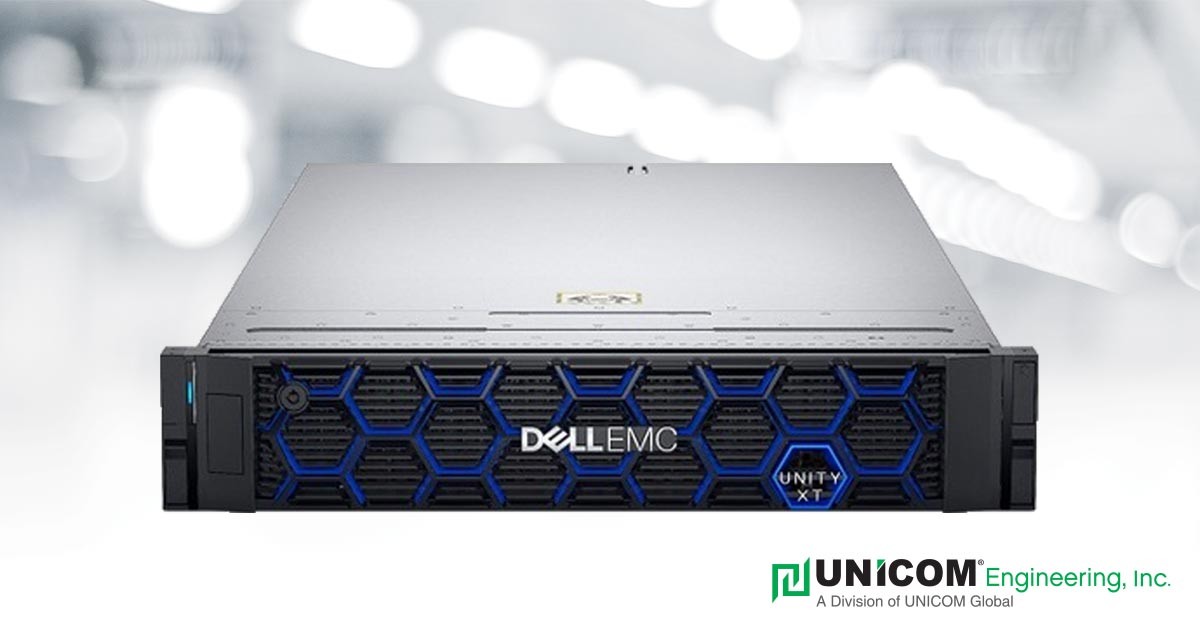Dell EMC Unity XT Storage
The Dell EMC Unity XT series of arrays offers simplicity, speed, and efficiency in a modern non-volatile memory (NVM) design. These arrays support virtualized applications, unified storage, and remote office requirements, making them ideal for hybrid cloud environments. The XT series may be classified into All-Flash and Hybrid-Flash models, all of which feature unified block, file, and VMware vVols support.
XT All-Flash
XT All-Flash arrays provide performance, efficiency, and simplicity in a small footprint. They provide twice the performance of previous generations at a fraction of the latency, making them ideal for running business applications no matter where they’re located. All-Flash arrays feature high-density SSDs with 15.3TB 3D NAND TLC drives and an enclosure that supports 80 flash-drives in three-rack units for greater space efficiency.
The All-Flash design includes the following features:
- Linear multicore scaling
- Inline data reduction
- Zero impact garbage collection
- Write coalescing
- Intelligent wear-leveling
The Dell EMC Unity XT 380F has a maximum storage capacity of 2.4PB with inline unified data reduction. The 480F has up to 4.0PB of storage and 5:1 unified data reduction for all flash pools. The 680F stores up to 8.0PB and provides up to 5:1 data reduction through inline deduplication and compression.
XT Hybrid Flash
XT Hybrid Flash arrays are engineered from the ground up to meet the current demand for performance, efficiency, and simplicity in a small footprint. These arrays also feature FAST Cache for improved IO performance and FAST VP for greater auto-tiering efficiency.
The Dell EMC Unity XT 380 is ideal for remote, branch office (ROBO) and midmarket applications. It provides up to 2.4PB raw capacity and includes inline data reduction for all flash pools.
The 480 is designed for a wide range of workloads and delivers up to 4.0PB of storage. It’s NVM-ready and performs unified data reduction for all flash pools.
The 680 is ideal for a wide range of SAN and NAS workloads. It delivers up to 8.0PB raw capacity, is NVM-ready, and provides up to 5:1 data reduction.
Dell EMC Unity XT Performance Enhancements
Dell Technologies asked Principled Technologies (PT) to quantify the latest architectural and hardware enhancements. They conducted independent performance tests on the Unity XT and a leading storage solution from a competitor referred to as Vendor A. A comparison of these results shows that Unity XT beats Vendor A’s solution in three separate performance tests.
Ultimately, National Cybersecurity Awareness Month reminds us to collectively re-evaluate our current stance on security. We all wish to garner the trust of our customers and partners. With trusted certifications like ISO 27001, UNICOM Engineering is able to gain that trust, not just in the month of October, but all year long. As we conclude our three-part series on cybersecurity, we hope you found our segment on ‘protecting customer data’ with information about ISO 27001 and information security frameworks useful. Learn more about other security and technology developments by reading our latest blog posts.
No Data Reduction
These 100% read tests were run with data reduction turned off. Unity XT’s raw performance for data-intensive workloads was 93% faster than Vendor A for 8k blocks and 47% faster for 32k blocks. This test shows a system’s overall ability to handle data types that aren’t impacted by array-based data reduction, including audio, photo, and video files. Additional data types in this category include Big Data like telemetry and genomic files, which are already compressed in most cases.
Data Reduction
The next set of tests was run with data reduction turned on, including compression and deduplication. These techniques maximize storage efficiency and space, which is especially important for virtual servers, file system data, archival data, backup data, and email data with multiple instances of the same attachments. Unity XT was 24% faster than Vendor A at 8k block sizes and 67% faster at 32k block sizes for 100% reads. A 70% read test showed that Unity XT beat Vendor A by 20%, which is more indicative of a real-world workload. Much of the difference in performance is due to the fact that Vendor A disables inline deduplication above a certain workload, while the Unity XT series always keeps data reduction active.
Efficiency
This 100% write test placed both arrays under a workload of 70,000 input/output operations per second (IOPS) with 8k block sizes. Its goal was to measure data reduction efficiency by keeping all other variables equal. The data reduction rate for the Unity XT 880F was 7:1, which was 129% more than Vendor A’s 3.05:1 rate. Vendor A’s system seemed to halt its inline data reduction process during the 3-hour pre-fill process, presumably to preserve IOPS.
Why Build on Dell EMC Unity XT with UNICOM Engineering?
As a Dell Technologies Titanium OEM Partner, UNICOM Engineering’s team can help you build your technology on the strength of Dell Technologies storage solutions. We can discuss factors such as data reduction and tier storage, whether you’re using a scale-up or scale-out methodology. Additionally, our flexible engagement model encompasses branding, engineering, logistics, manufacturing, regulatory compliance, and the technical services needed to support a complete storage solution. View our video "Why Build on Dell with UNICOM Engineering" or contact us by telephone at (800) 977-1010 to learn more about how we can help optimize your storage solutions.
